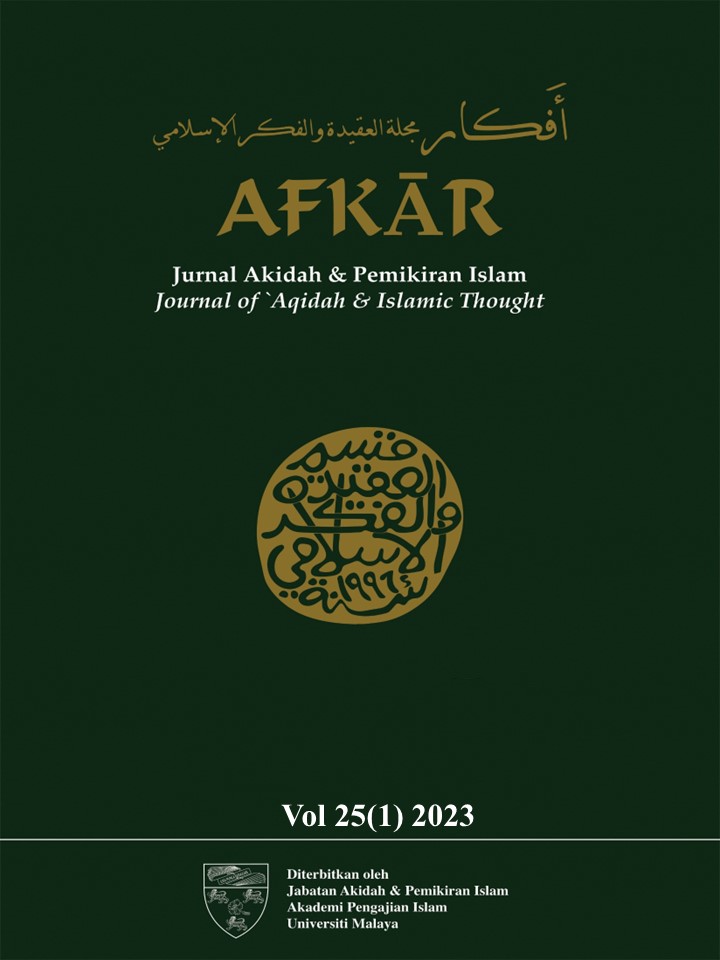Cyber Security for Children: Parental Monitoring from a Technological, Child Psychology and Islamic Psychospiritual Perspective during the Covid-19 Pandemic
Main Article Content
Abstract
Cyber ethics awareness and education is crucial when children surf the internet especially during the Covid-19 pandemic situations where internet use is a common norm. During the pandemic, children from preschool until secondary school level had to stay at home and learn online (Teaching and Learning at Home (PdPR)). In this study, interviews are conducted to parents on how children surf the internet during the pandemic and how parents monitor and advise their children. The findings of this research suggest that parental monitoring of children related to cyber issues is equally important for the children. Parents are noticeably given a lot of advice regarding the appropriate way of communicating when playing games, the types of games played by children, the commandments and prohibitions of Allah in Islam, and also the safety and health’s concern of children when playing games. Not only that, but parents also suggested to government agency such as Malaysian Communications and Multimedia Commission (MCMC) to increase regulation on those inapproproate websites in Malaysia and take proactive measures to prevent our personal data be misused by the cyber criminals such as scammers and pornorgraphy’s criminals. Proactive measures need to be taken by the government such as making restrictions on games like Mobile Legend because of the destructive effects it could have on the children’s behavior. Children who are negatively affected by the game will likely stay home most of the time and are reluctant to socialize. Besides, there are also other concerning safety issues raised by parents when children play games such as abusive words, bullies, games addiction and pornography
Downloads
Article Details

This work is licensed under a Creative Commons Attribution-NonCommercial 4.0 International License.
References
Ahmad ibn Hanbal. Musnad Imam Ahmad Bin Hanbal 5, trans. Nasiruddin Al-Khattab. n.p: Darussalam Publishers and Distributors, 2019.
Badri, Malik. Konflik Ahli Psikologi Islam, trans. Fadlullah Wilmot. Petaling Jaya: IBS Buku Sdn Bhd, 1989.
Bioglio, Livio et al.. “A Social Network Simulation Game to Raise Awareness of Privacy among School Children”. IEEE Transactions on Learning Technologies 12(4) (2019): 456–469.
CyberSafe Malaysia. “CyberSafe Parent”. https://www.cybersafe.my/cyberparent-tips.html,13th May 2022.
Danet, Marie. “Parental Concerns about their School-aged Children’s Use of Digital Devices”. Journal of Child and Family Studies 29(4) (2020): 2890–2904, doi:10.1007/s10826-020-01760-y.
Al-Ghazali, Abu Hamid Muhammad bin Muhammad. Ihya’ ‘Ulum al-Din 3. Beirut: Dar al-Ma‘rifah, 1982.
Huzaemah Tahido Yanggo. Didik Anak Gaya Rasulullah. Selangor: PTS Milennia Sdn Bhd, 2011.
International Telecommunication Union (ITU). “Guidelines for Parents and Educators on Child Online Protection 2020”. Geneva, Switzerland, 2020, https://www.itu-cop-guidelines.com/parentsandeducators.
Jamshed, Shazia. “Qualitative Research Method-Interviewing and Observation”. J Basic Clin Pharm 5(4) (2014): 87-88, doi: 10.4103/0976-0105.141942. PMID: 25316987; PMCID: PMC4194943.
Kementerian Komunikasi dan Multimedia Malaysia, CyberSecurity Malaysia. “Cybersafe Parenting: Ke Arah Kesejahteraan Siber, Ancaman Kesihatan Siber”. 2022, https://www.cybersafe.my/en/download/CyberSAFE%20Parenting_Booklet-BM-online.pdf.
Kementerian Pendidikan Malaysia. “National Education Philosophy”. 2022, https://www.moe.gov.my/en/dasarmenu/falsafah-pendidikan-kebangsaan.
Kementerian Pendidikan Malaysia. “Penerangan Kurikulum Prasekolah Kebangsaan (Semakan 2017)”. Portal Rasmi Bahagian Pembangunan Kurikulum, http://bpk.moe.gov.my/index.php/terbitan-bpk/pra-sekolah.
Kementerian Pendidikan Malaysia. “Surat Pekeliling Ikhtisas”. 2017, https://www.moe.gov.my/pekeliling/2797-surat-pekeliling-ikhtisas-kementerian-pendidikan- malaysia-bilangan-3-tahun-2017-garis-panduan-nilai-dan-etika-penggunaan-media-sosial-bagi-guru-dan-murid/file.
Malaysian Communications and Multimedia Commision. “Cybersafe Parenting: Ke Arah Kesejahteraan Siber, CyberSecurity Malaysia”. 2021, https://www.cybersafe.my/cyberparent-tips.html.
Malaysian Communications and Multimedia Commision. “Online Harassment of Schoolkids as High as 70%: Survey”. Digital News Asia 09 Sep 2014. https://www.mcmc.gov.my/en/media/press-clippings/online-harassment-of-school,kids-as-high-as-70-surv.
Moh. Sholeh Imam Musbikin. Agama Sebagai Terapi: Telaah Menuju Ilmu Kedokteran Holistik. Yogyakarta: Pustaka Pelajar, 2005.
Muir, Kate & Joinson, Adam. “An Exploratory Study into the Negotiation of Cyber-security within the Family Home”. Frontiers in Psychology 11 (2020): 1-14, https://doi.org/10.3389/fpsyg.2020.00424.
Nasr, Seyyed Hossein. “The Qur’ān and Hadīth as Source and Inspiration of Islamic Philosophy”. In History of Islamic Philosophy, eds. Seyyed Hossein Nasr & Oliver Leaman. London & New York: Routledge, 1996.
Nik Rosila Nik Yaacob. Pendidikan Kerohanian dan Moral Prasekolah. Batu Caves: PTS Professional, 2010.
Nor Azah Abdul Aziz et al. Pembangunan Perisian Multimedia Untuk Kanak-kanak Pra Sekolah. Kuala Nerus: UniSZA, 2021.
Nor Azah Abdul Aziz. “Aplikasi Skrin Sesentuh iPad: Gerakan Jari yang selalu digunakan untuk Kanak-Kanak”. Jurnal Pendidikan Awal Kanak-Kanak (2) (2013): 100-115.
Nor Azah Abdul Aziz. “Children’s Interaction with Tablet Applications: Gestures and Interface Design”. International Journal of Computer and Information Technology 2(3) (2013): 447-450.
Quayyum, Farzana, Cruzes, Daniela S. & Jaccheri, Letizia. “Cyber Security Awareness for Children: A Systematic Literature Review”. International Journal of Child Computer Interaction 30(2) (2021): 1-40. doi: 10.1016/J.IJCCI.2021.100343.
Siti Nor Lailiyah Ibrahim, Yusmaria Mohd Yusoff, Zulkarnain Hassan. “Covid-19: Sikap, Motivasi dan Halangan Dalam Pelaksanaan Pengajaran dan Pembelajaran Dalam Talian (PdPDT) Pelajar Kolej Komuniti Semasa Perintah Kawalan Pergerakan (PKP)”. Jurnal Dunia Pendidikan 3(4) Special Issue (2021): 77-91, https://myjms.mohe.gov.my/index.php/jdpd/article/view/16673.
Smahel, David et al.. “EU Kids Online 2020: Survey Results from 19 Countries”. EU Kids Online 2020, https://www.lse.ac.uk/media-and-communications/research/research-projects/eu-kids-online/eu-kids-online-2020.
Suherman, Rizky Novitasari et al.. “The Relationship between Parenting Style and Gadget Addiction among Preschoolers”. Malaysian Journal of Medicine and Health Sciences (2021): 117-122.
Sujadmiko, B., Natamihardja. R. & AB Wiranata, I. G.. “Youth Cyber-Ethic: Indonesian Policy Framework and Sociological Approach”. Utopía y Praxis Latinoamericana 26(3) (2021): 47-59, https://doi.org/10.5281/zenodo.4969640.
Terjemahan Al-Quran Bahasa Melayu, Surah.My, 2022, https://www.surah.my.
UNICEF. “A Parents Guide: How to Talk to Your Children about the Internet”. Telenor Group with Cyber Security Malaysia, October 2015, https://www.unicef.org/malaysia/media/586/file/Talk%20to% 20your%20children% 20about%20the%20internet.pdf.
Verenikina, Irina, Harris, Pauline & Lysaght, Pauline. “Child’s Play: Computer Games, Theories of Play and Children’s Development”, in Proceedings of CRPIT ‘03, Australian Computer Society, 34, 2003: 99-106.
Wan Muhammad Fadzil. “National Cyber Security Awareness Baseline Study 2016”. Final Report, 2016, https://www.cybersecurity.my/data/content_files/26/2027.pdf.

